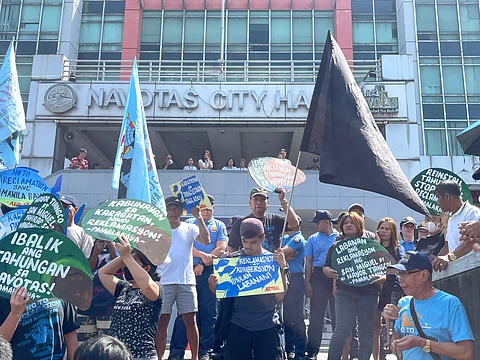
- NEWS
- the EDIT
- COMMENTARY
- BUSINESS
- LIFE
- SHOW
- ACTION
- GLOBAL GOALS
- SNAPS
- DYARYO TIRADA
- MORE

Fisherfolks in Navotas City decry loss of their income, a year since the removal of tahungan (mussel farms) within Manila Bay.
PAMALAKAYA group held a protest last Friday morning in front of Navotas City Hall as they asked the local government to allow them to reinstall the bamboo sticks where mussels and other shellfish attach themselves.
“Actually, those bamboo sticks are eco-friendly because as they decompose, mussels attach to them, and over time, they even become food for fish,” PAMALAKAYA Secretary General Salvador France said during the protest.
The group also noted that ongoing reclamation in cities surrounding Navotas has disrupted the natural movement of fish, making harvesting more difficult and forcing them to spend more time securing the needed catch.
Rommel Escarial, president of PAMALAKAYA, said that the removal of tahungan also prompted some fisherfolk to leave Navotas City due to livelihood difficulties.
“It’s even harder now without the mussel farms. Our income is low, forcing some of us to look for other jobs or return to our provinces,” Escarial said, emphasizing that the fishing industry has been one of the prominent livelihoods in Navotas City.
Navotas City Public Information Officer Irish Cubillan said that they are just following the Supreme Court Mandamus in terms of “cleaning” the Manila Bay, and that they have offered livelihood assistance to the affected fishermen.
“We also issued prior notices before conducting the demolition, and we also extended the deadline to grant their requests,” Cubillan added.
In June 2024, PAMALAKAYA filed a petition with the Navotas Regional Trial Court, seeking a temporary restraining order (TRO) against the Navotas City government over the removal of mussel farms and fish traps in the bay.
Overall, fishing industry in the country faced a bigger difficulty after a Supreme Court decision which allowed commercial fishing operators to harvest within municipal waters.
